Are you interested in learning what happens to materials that we throw away and how we can use materials more sustainably?
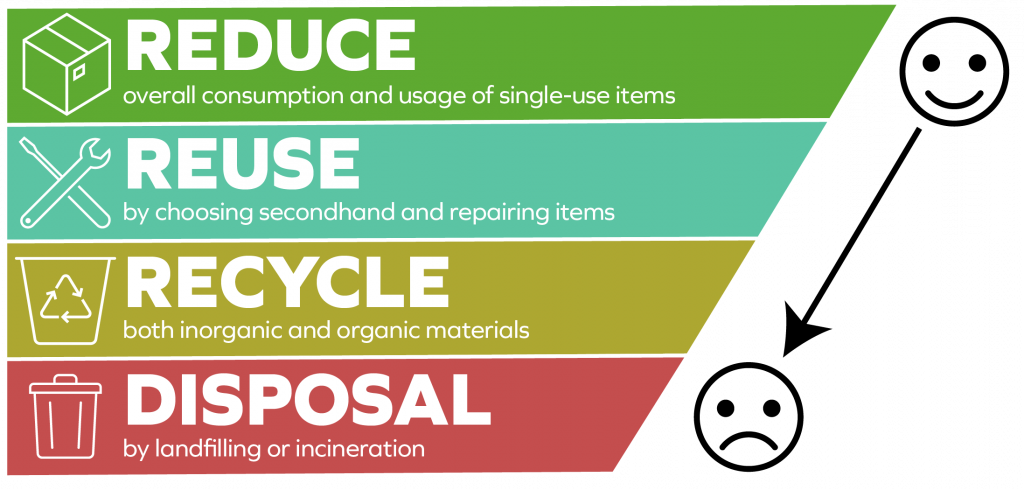
The NYS Sustainable Materials Management (SMM) Stewardship Program provides a unique opportunity to explore the concepts of sustainability and waste systems, and then apply this knowledge in your community. This program focuses on prioritizing beneficial uses of materials based on the waste hierarchy (reduce, reuse, recycle) with the intent of moving towards a circular economy. Stewards learn about a variety of materials including recyclables, organics and food waste, single-use plastics, textiles, furniture, electronics, and more.
The stewardship program is an entirely remote, paid college internship opportunity that takes place every year (Fall-Spring), with a one-time stipend received at the end of the program.
The NYS SMM Stewardship Program has been operating since 2015 and was modeled after the successful GREEN-PR program. The goal of the NYS SMM Stewardship Program is to equip stewards with the knowledge to orchestrate hands-on community projects by applying their SMM training, while gaining valuable skills they can translate into their daily lives, the workforce, and/or academia. These projects can educate or integrate SMM practices into schools, organizations, businesses, and others throughout New York State. Stewards carry out these initiatives, while also developing leadership and communication skills, networking with SMM professionals, and gaining professional experience. Many program graduates go on to work in sustainability-related fields, making this an ideal program for those seeking to begin or advance a SMM career.
ANNOUNCING:
Newly expanded YEAR-LONG program!
Due to increased statewide interest in the NYS SMM Stewardship Program, we have expanded the program to take place over a full school academic year (Fall-Spring).
Recruiting for the stewardship program will now occur in the Spring of the preceding year, trainings will be offered in the Fall of that same year, and steward community projects will take place in the Spring of the following year. This new timeline will also give stewards more time for trainings and to complete their hands-on community projects.
The next round of the NYS SMM Stewardship Program is from Fall 2025-Spring 2026.
Applications are CLOSED for 2025-2026!
Check back here in early Spring 2026 for our next round of applications.
Qualifications
This program is a remote opportunity that is open to any and all college/university students attending a community college, undergraduate, or graduate program in New York State. Students with a professional interest in sustainable materials management are preferred.
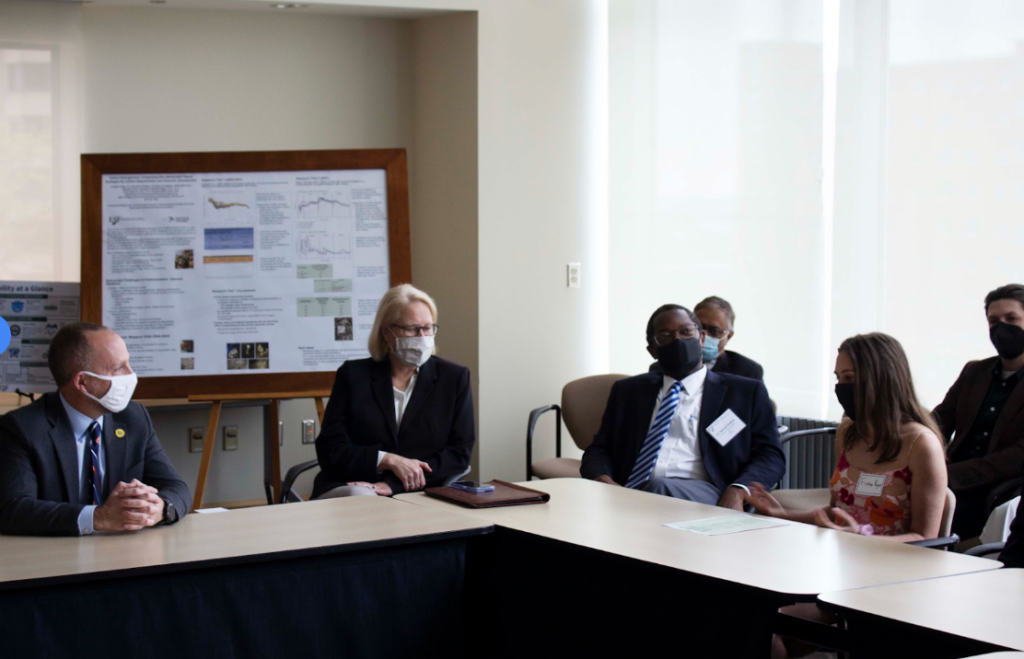
Program Requirements and Stipend
Stewards are expected to commit approximately 10 hours of training time and 40 hours of paid project time over the course of the program and accumulate the minimum amount of points for personal development, professional networking, and community engagement. These points include key required tasks, such as participating in the training program, completing a community-based SMM project, and presenting at a virtual end-of-year symposium.
Participating stewards meeting the program requirements by the end of the stewardship program will receive a one-time stipend of $640 following completion of all program requirements and submission of final materials.
Timeline and Important Dates
Year-long Stewardship Program Timeline:
- Spring 2025: Applicant recruitment
- Monday August 18 2025: Welcome Meeting (5:00-6:00pm ET via Zoom)
- Trainings: Fall 2025 (see schedule below)
- Community Projects: Spring 2026
Fall 2025 Training Schedule:
Trainings will take place on Monday evenings, twice a month through Fall 2025
Time: 5:00-6:00pm Eastern Time
Location: Zoom
Dates:
- Monday September 8, 2025 – Introduction to Sustainable Materials Management
- Monday September 22, 2025 – Refuse & Reduce
- Monday October 6, 2025 – Reuse & Repair
- Monday October 20, 2025 – Recycling
- Monday November 3, 2025 – Compost, Food Waste, & Organics Management
- Monday November 17, 2025 – Environmental Communication
Note: This is a remote program. All trainings, meetings, presentations, and the symposium will be held virtually via Zoom.
Learning Objectives & Training Opportunities
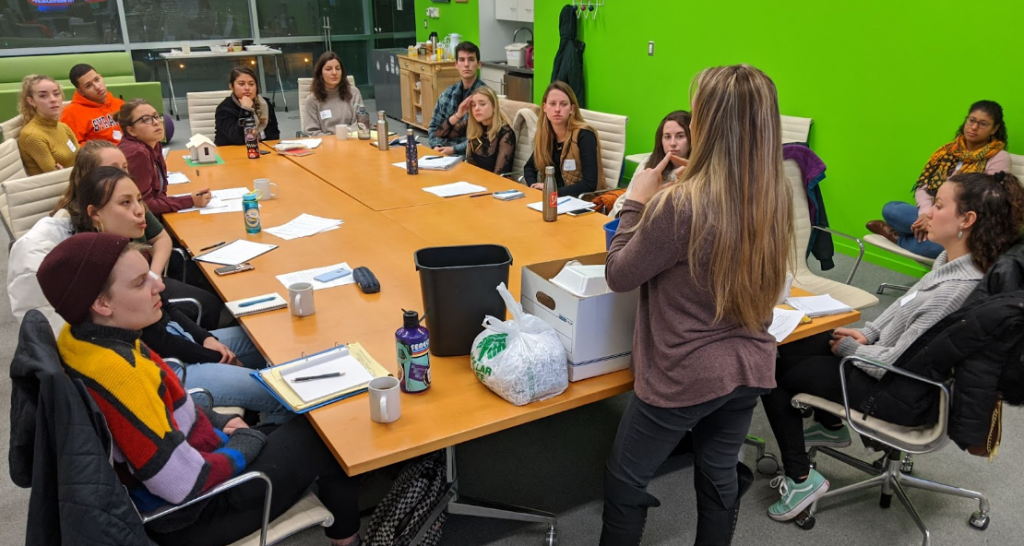
Personal Development
Stewards will leave this program with…
- An advanced knowledge of sustainable materials management, the waste hierarchy, and our current linear (take-make-dispose) economy.
- A deeper understanding of key waste issues and opportunities, including, but not limited to: landfilling, waste incineration, planned obsolescence, life cycle analyses (LCAs), greenwashing, green consumerism, circular economy, reuse, deconstruction, repair cafes, plastic pollution, microplastics, food waste, food insecurity, recycling, materials recovery facilities (MRFs), and environmental communication.
- An understanding of the essential shift of responsibility for materials from individual consumers to the industries and policies which manufacture, use, and dispose of materials, while emphasizing the impacts of consumerism on our materials economy.
- A grasp of life-cycle thinking and the importance and limitations of life cycle analyses.
- Knowledge of sustainability marketing and how it relates to greenwashing and green consumerism.
Professional Networking
Stewards will gain…
- Networking connections to various SMM professionals and organizations throughout New York State.
- Public speaking experience toward various audiences and stakeholders, including a presentation at a regional Sustainable Materials Management symposium at the end of the program.
- Connections to other like-minded stewards throughout the state!
Community Engagement
Students will engage communities, resulting in…
- First-hand experience with organizing and facilitating a community event focused on sustainable materials management.
- The broader dissemination of SMM knowledge.
- A better understanding of how SMM is experienced by the community and the challenges they face.
- A measurable and meaningful impact (number of attendees, bags of litter cleaned up, number of textiles exchanged, etc).
- Creative approaches to SMM challenges, fit to the background of the steward and the needs of the community.
Past Stewards Project Examples
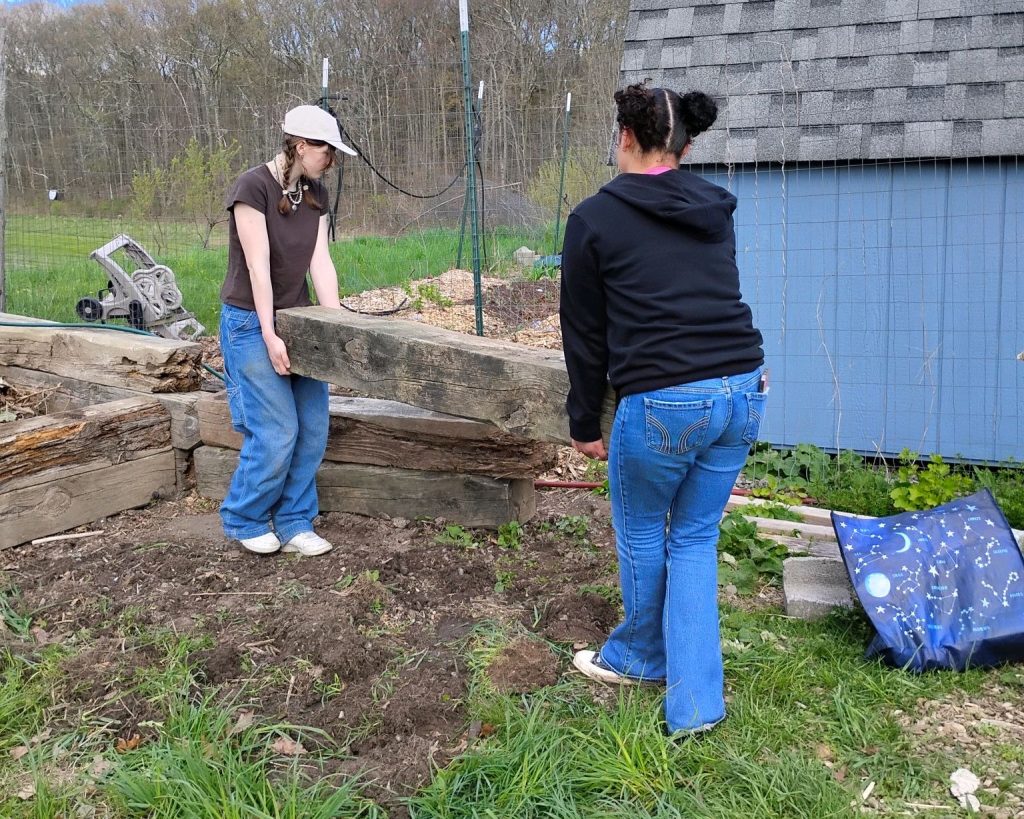
Brianna Rodriguez worked with 20 other members of the Environmental Alliance to revitalize a food scraps compost setup at Seed Song Farm’s community garden.
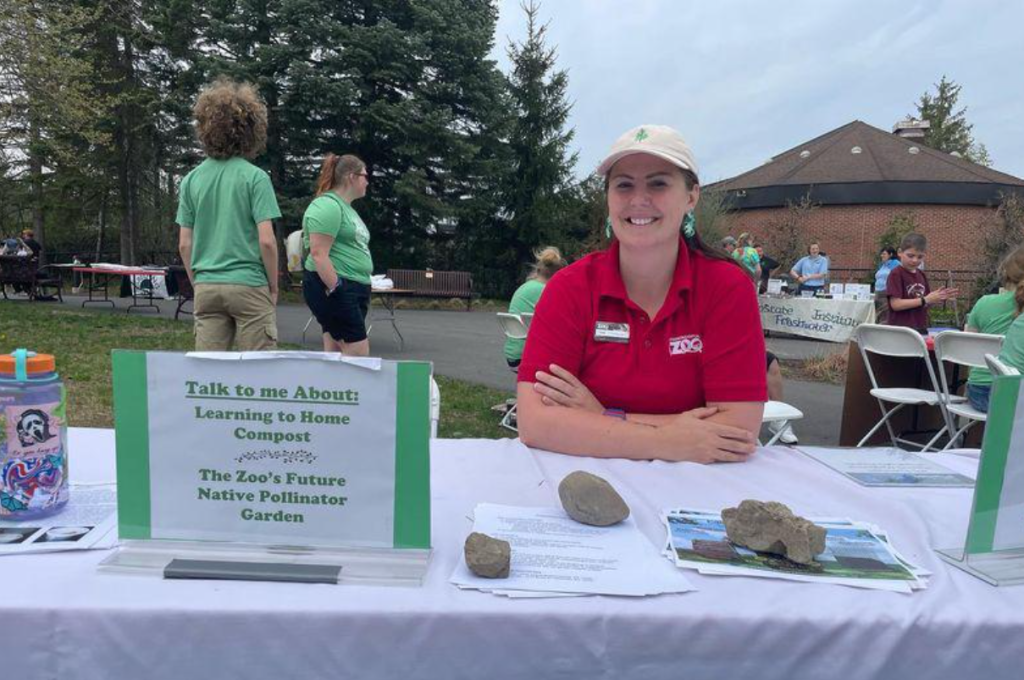
Emily tabled at the Rosamond Gifford Zoo’s annual Earth Day event called “Party for the Planet,” engaging over 200 attendees on topics such as composting and the zoo’s future native pollinator garden.
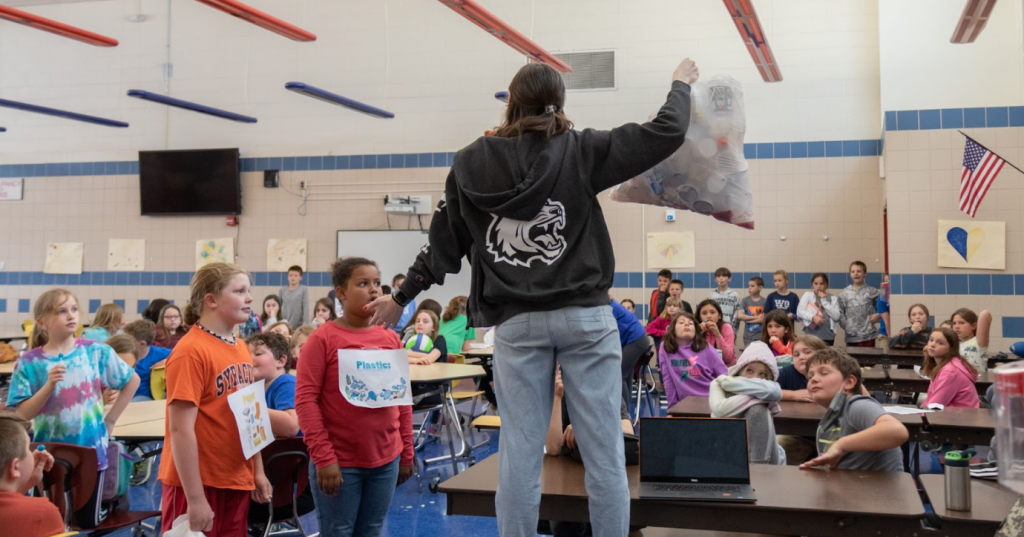
Haley engaged administrators, staff, and students at Watkins Glen Elementary School by presenting on food waste issues and solutions and conducting a waste audit with ~200 students.
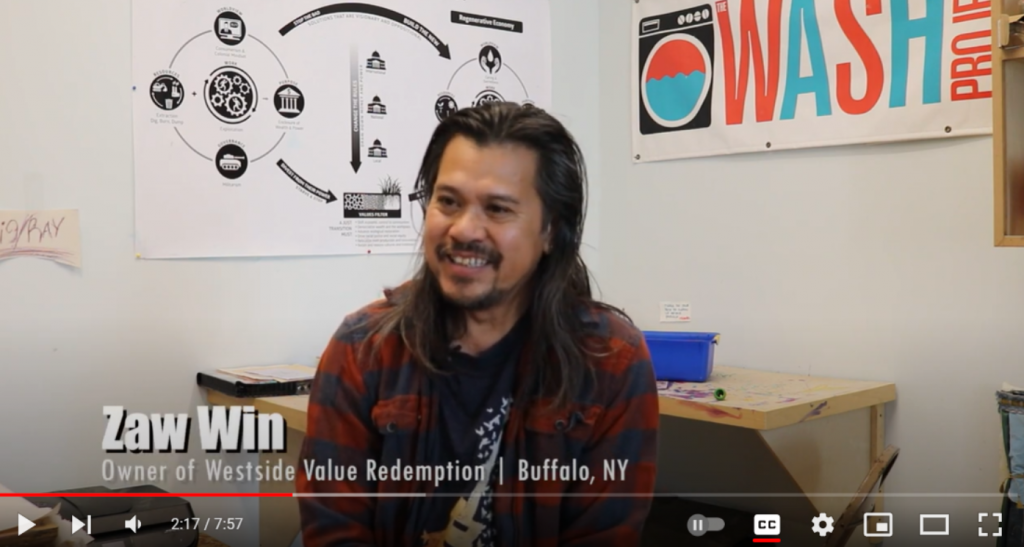
Eva created a short documentary film about bottle and can redemption centers in Buffalo, NY, illuminating the hidden social and economic impacts of recycling in marginalized communities.
Do you have any questions or are interested in learning more about the SMM Stewardship Program? If so, please contact ISE Program Associate, Morgan Ingraham, at meingrah@syr.edu
This program is funded by New York State Association for Reduction, Reuse, and Recycling (NYSAR3), the Center for Sustainable Materials Management (CSMM) at the State University of New York College of Environmental Science and Forestry (SUNY-ESF), and the United States Department of Agriculture (USDA).
© 2025 State University of New York College of Environmental Science and Forestry. Funding provided by the Environmental Protection Fund administered by the New York State Department of Environmental Conservation. Any opinions, findings and/or interpretations of data contained herein are the responsibility of the State University of New York College of Environmental Science and Forestry and its Center for Sustainable Materials Management and do not necessarily represent the opinions, interpretations, or policy of the State.
USDA’s Non-Discrimination Statement: in accordance with Federal civil rights law and U.S. Department of Agriculture (USDA) civil rights regulations and policies, USDA, its Mission Areas, agencies, staff offices, employees, and institutions participating in or administrating USDA programs are prohibited from discriminating based on race, color, national origin, religion, sex, gender identity (including gender expression), sexual orientation, disability, age, marital status, family/parental status, income derived from a public assistance program, political beliefs, or reprisal or retaliation for prior civil rights activity, in any program or activity conducted or funded by USDA (not all bases apply to all programs). Remedies and complaint filing deadlines vary by program or incident. Program information may be made available in languages other than English. Persons with disabilities who require alternative means of communication or to obtain program information (e.g. Braille, large print, audiotape, American Sign Language) should contact the responsible Mission Area, agency, or staff office; the USDA TARGET Center at (202) 720-2600 (voice and TTY); or the Federal Relay Service at (800) 877-8339.
